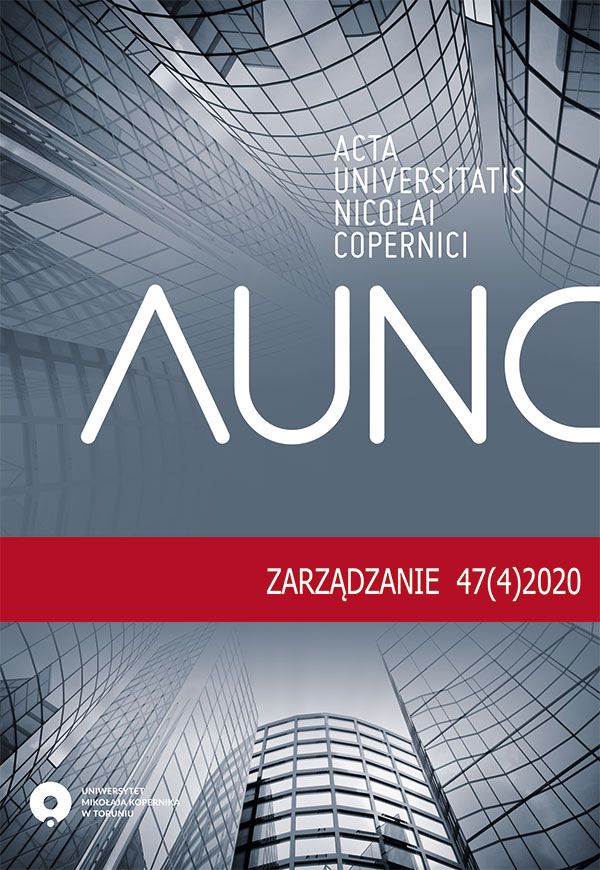Budowanie marki w sektorze dóbr luksusowych: Strategia, wyzwania i perspektywy rozwoju
DOI:
https://doi.org/10.12775/AUNC_ZARZ.2021.02.006Keywords
brand, luxury goods, brand strategy, sustainability, digitalizationAbstract
The article analyzes the process of brand building in the luxury goods sector, focusing on key elements such as tradition, innovation, and sustainability. It discusses the evolution of luxury brand strategies, their contemporary challenges, and future development perspectives. The study highlights the importance of storytelling, personalization, and digital technologies in shaping brand image and customer relationships. Based on an analysis of content published by luxury brands on social media platforms in 2020, it demonstrates how platforms like Instagram and Facebook support consumer communication, reinforcing brand values and authenticity. The article concludes that the future of luxury brands will depend on the skillful integration of traditional values with innovative strategies, such as sustainability, digitalization, and globalization.
References
Bastien, W., Kapferer, J.N., More on Luxury Anti-Laws of Marketing, [in:] K.P. Wiedmann, N. Hennings (Eds.), Luxury Markting. A Chellenge for Theory and Practice, Springer Gabler, Wiesbaden, 2013.
Beverland, M. (2004). Uncovering “theories-in-use”: Building luxury wine brands. European Journal of Marketing, 38(3/4).
Boisvert, J., Ashill, N. (2018) The spillover effect of downward line exteinsions on U.S. consumers` evaluation of a French luxury parent band: The role of branding strategies , authenticity and fit, Psychology & Marketing, 35(10).
De Klerk, H., Kearns, M., Redwood, M. (2019). Controversial fashion, ethical concerns and environmentally significant behaviour: The case of the leather industry. International Journal of Retail & Distribution Management, 47(1).
Dolińska-Weryńska, D. (2015), Branding emocjonalny w zarządzaniu wartością marki, Zeszyty Naukowe Politechniki Śląskiej, Seria Organizacja i Zarządzanie, 85(1943).
Donze, P.Y., Wubs, B. (2019). Storytelling and the making of a global luxury fashion brand: Christian Dior. International Journal of Fashion Studies, volume 6/1, 83-102.
Fionda, A., Moore, C. (2009). The anatomy of the luxury fashion brand. Journal of Brand Management, 16(5-6).
Hung, K.P., Chen, A., Peng, M., Hackley, Ch., Tiwsakul, R., Chou, Ch. (2011) Antecedents of luxury brand purchase intention, Journal of Product & Brand Management 20/6, 457-467.
Kent, S. (2018). Gucci, Prada Join Fur-Free Luxury Club. Business of Fashion. Retrieved from https://www.businessoffashion.com.
Kumar, V., Christodoulopoulou, A. (2014), Sustainability and branding: An integrated perspective, Industrial Marketing Management, 43(1).
Liczmańska, K., (2008). Silna marka jako źródło przewagi konkurencyjnej w momencie zakupu. Roczniki Ekonomiczne Kujawsko-Pomorskiej Szkoły Wyższej, nr 1, 87-99.
Liczmańska K., (2010) Efekt kraju pochodzenia produktu a decyzje nabywcze konsumentów sektora alkoholi wysokoprocentowych, Roczniki Ekonomiczne Kujawsko-Pomorskiej Szkoły Wyższej w Bydgoszczy, nr 3.
Liczmańska, K. (2015). Kluczowe czynniki determinujące zachowania konsumenckie na przykładzie mieszkańców województwa kujawsko-pomorskiego. Zeszyty Naukowe Uniwersytetu Szczecińskiego, Problemy Zarządzania, Finansów i Marketingu, 41(2).
Liczmańska, K., (2016). Strategie produktowe marek na rynku FMCG. Wydawnictwo Naukowe Uniwersytetu Mikołaja Kopernika w Toruniu, Toruń.
Liczmańska-Kopcewicz K., Wiśniewska A., (2019). The Importance with Customers for Innovative Results of Enterprises in the FMCG Sector – the Perspective of the Industry 4.0 Concept. Proceedings of the 34rd International Business Information Management Association Conference, IBIMA 2019: Vison 2025: Education Excellence and Management of Innovations through Sustainable Economic Competitive Advantage, International Business Information Management Association, 13325-13338.
Moore, C., Birtwistle, G. (2005). The Burberry Business Model: Creating an International Luxury Fashion Brand. International Journal of Retail & Distribution Management, 33(8).
Phan, M., Thomas, R., Heine, K. (2011). Social Media and Luxury Brand Management: The Case of Burberry. Journal of Global Fashion Marketing, 2(4).
Pookulangara, S., Shephard, A. (2013). Slow fashion movement: Understanding consumer perceptions—An exploratory study. Journal of Retailing and Consumer Services, 20(2).
Skrzypek, E., Pinzaru, F. (2017). Marka jako ważny element marketingu, Zeszyty Naukowe Uniwersytetu Przyrodniczo-Humanistycznego w Siedlcach. Seria: Administracja i Zarządzanie, Uniwersytet Przyrodniczo-Humanistyczny (Siedlce), 41(114).
Staker, K.,, Wrigley, C. (2016) Emotionally engaging customers in the digital age: the case study of ‘Burberry love’, Journal of Fashion Marketing and Management, 20(3).
Wiśniewska A., (2012). Mechanizm oddziaływania wizerunku marki na zachowania konsumentów, Acta Universitatis Nicolai Copernici, Zarządzanie, vol. 39. (407), 187-196.
Wiśniewska A., (2014). Strategia lojalności konsumentów, Acta Universitatis Nicolai Copernici, Zarządzanie, vol. 1, 39-52.
Wiśniewska, A., Dudko, M., (2016). Budowa programów lojalnościowych, Acta Universitatis Nicolai Copernici, Zarządzanie, vol. 1, 9-24.
Downloads
Published
How to Cite
Issue
Section
License

This work is licensed under a Creative Commons Attribution-NoDerivatives 4.0 International License.
Stats
Number of views and downloads: 476
Number of citations: 0







